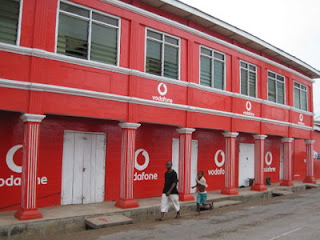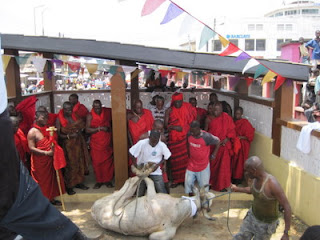It’s been a long day in the office, you pack up your laptop, brave the 10min walk through town in the heat, and with the sweat building on your back, turn the last corner to arrive at the taxi rank.
An expensive taxi in Ghana is a ‘dropping’ taxi, which will pick you up and drop you off where you want to go. New cars or those in reasonably road worthy condition start life as dropping taxis. But they are expensive. Westerners on holiday or very rich Ghanaians use them, everyone else takes shared taxis.
The shared taxi is the car which has finished life as a ‘normal’ taxi, because it is no longer strictly fit for road use.
So you arrive at the taxi rank, now pouring with sweat. Unfortunately the front car is full and about to pull off. Assuming you'll be waiting in the next cab you make your way towards the second car, only for shouting to erupt around you, with the queuing drivers pointing back towards the first taxi. To your surprise, the chap in the front seat has jumped out, 'made room' in the back, and is squeezing his way in with the other passengers. As the driver gets out to help him close the door the exhaust briefly hits the floor. Surely a front seat is for one person you think, but no, it turns out there's room in this car for two more...
Now for the dice role...
The Good
It transpires that your cab’s not too old, the engine works fine and the 12km trip down the coast home is actually quite pleasant. You even make the driver smile with the broken Fanti you've learnt in the past month.
The Bad
The car is tired and the 60mph road home is just too much for it. However your luck is in and the driver is an F1 fan who’s done this route before. It seems that by tucking in 3ft from the car in front the weary taxi will, in fact, get to 60 mph, and can even by launched, slingshot style around other cars with the driver making maximum possible use of the horn.
The horn is not really used in the west, drivers rely on their eyes and wing mirrors instead. Ghanaians use the horn a lot. Out here it is not the responsibility of the person pulling onto the road, or making the overtake, or going into a U turn to look at the traffic around them. It is the responsibility of anyone whom this manoeuvre would adversely affect to blast the horn continuously until the driver notices and stops. It actually works very well, after all you know far better if you’re going to hit someone than if someone is going to hit you, hence the ‘reversal’ of responsibilities.
With Hamilton up front you arrive home in remarkable time, coming gently to a halt by your house. The driver is gutted you weren’t travelling to the end of his route, his hard work overtaking for the past 10 minutes is rapidly being undone as you climb out of the car.
It transpires that your cab’s not too old, the engine works fine and the 12km trip down the coast home is actually quite pleasant. You even make the driver smile with the broken Fanti you've learnt in the past month.
The Bad
The car is tired and the 60mph road home is just too much for it. However your luck is in and the driver is an F1 fan who’s done this route before. It seems that by tucking in 3ft from the car in front the weary taxi will, in fact, get to 60 mph, and can even by launched, slingshot style around other cars with the driver making maximum possible use of the horn.
The horn is not really used in the west, drivers rely on their eyes and wing mirrors instead. Ghanaians use the horn a lot. Out here it is not the responsibility of the person pulling onto the road, or making the overtake, or going into a U turn to look at the traffic around them. It is the responsibility of anyone whom this manoeuvre would adversely affect to blast the horn continuously until the driver notices and stops. It actually works very well, after all you know far better if you’re going to hit someone than if someone is going to hit you, hence the ‘reversal’ of responsibilities.
With Hamilton up front you arrive home in remarkable time, coming gently to a halt by your house. The driver is gutted you weren’t travelling to the end of his route, his hard work overtaking for the past 10 minutes is rapidly being undone as you climb out of the car.
The Ugly
What you failed to notice as you climbed into the taxi were the huge cracks in the front windscreen, the tape holding the both windscreens in place, the fact that every panel in the car was dented and that you have a large piece of rust stuck to your trousers which you’ve no idea of the origin.
This car is not awaiting scrapping in a used car yard, it is parked in the shared taxi rank, and will shortly fill with 'customers'
The driver pulls away, then immediately turns off the engine and coasts down a very slight incline of a road, in a major city, at about 10mph with cars beeping and overtaking at every opportunity. He has no fuel. Thankfully 'drives' knows that this incline, along with the three turnings he must make without breaking, will lead to the petrol station. Five minutes of rolling later you arrive at the pump. As a general rule Ghanaians don’t refuel their car to more than half a tank, often less. Having a tank full of fuel would show that you have a decent stock of money, and in sub-Saharan culture your friends and family are allowed to ask for things which you have an excess off. It’s very difficult to decline these requests as you are ‘shunning’ those in need in your circle, which will result in bad blood between you. Losing friends is very low on people’s to do list out here.
So the driver drops in £2 worth of fuel and you’re away again. 4th and 5th gears are long gone, and you gently ease up to 30mph to travel along the 60mph coastal road home. You spend the next 15 minutes cowering in your seat with every vehicle under the sun coming thundering past you, horn blaring.
When you arrive home you are in dire need of a beer, and spend the next hour writing a blog about your misadventures.
So the driver drops in £2 worth of fuel and you’re away again. 4th and 5th gears are long gone, and you gently ease up to 30mph to travel along the 60mph coastal road home. You spend the next 15 minutes cowering in your seat with every vehicle under the sun coming thundering past you, horn blaring.
When you arrive home you are in dire need of a beer, and spend the next hour writing a blog about your misadventures.




















